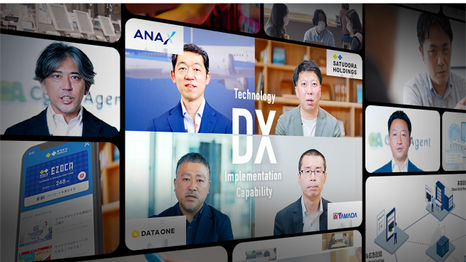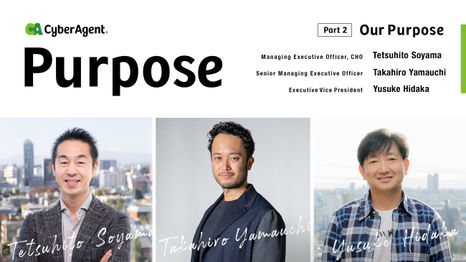Leadership Transitions: The Handover from the Founding President to the Second Generation

The founder and president of CyberAgent, Susumu Fujita, announced his intention to step down and began grooming a successor in spring 2022. After selecting 16 candidates and a preparation period spanning three and a half years, we announced our next presidential candidate on November 14, 2025. This matter is set to be officially approved at the 28th Annual Shareholders Meeting on December 12, followed by the Board of Directors meeting. We spoke with current president Susumu Fujita and incoming president-designate Takahiro Yamauchi about this transition.
Contents
Taking on the Presidency from Scratch: Aiming for 80% Completion in the Coming Four Years
A Journey to Full Succession: Commitment to Mentoring the Second-Generation Leader
Eradicating Procrastination and Inheriting a Culture of Continuous Transformation
Taking on the Presidency from Scratch: Aiming for 80% Completion in the Coming Four Years
Fujita:
In spring 2022, I declared that "in four years, I will become chairman with representative authority, and hand over the president’s role to someone." I then selected 16 potential successors and began preparations. Through academic training and decision-making simulations, I realized yet again that transitioning from founding President to second generation is especially challenging.
As the founding president, I often made decisions without much need to explain them internally, which meant that experience accumulated with me alone, widening a gap with others. To address this, I documented my previous intuitive approach, created handover materials, and conducted training sessions by myself. These efforts not only prepared the next president but also strengthened the management team that will support them.
Yamauchi:
The most significant outcome from the succession planning process for me was the unity developed among the second-generation leaders. While often portrayed as a "president race," we approached it as a collective challenge. After training sessions, we gathered and discussed that we'd support whoever became president. Over the past three and a half years, we have built a shared commitment to growing the company as the next generation of leadership.

—After this preparatory period, how did you feel when you learned you had been selected as the next president?
Yamauchi:
Honestly, I felt the weight of responsibility more than pleasure. The training made me truly understand the difficulty of this role. I questioned myself “Could I grow the company like our founding president, Fujita?” “Would I cause anxiety among our stakeholders—employees, shareholders, and business partners?”
Fujita:
It's only natural to feel uneasy, no matter how thoroughly he prepares. There are also things he can’t truly grasp until you actually become president. The sense of responsibility and pressure that come with the role, as well as the insight and vision needed to make critical decisions — these are things you develop only once you’re in that position.
Therefore, for this leadership transition, we have established a dual representative director system with the chairman and the president. Deliberately choosing not to divide roles, I will hand over the president’s role from the ground up. By 2027, two years from now, the new president will announce his own medium to long-term vision. Furthermore, by 2029, four years from now, we aim to complete the handover of 80% of the president's duties.
Personally, even after becoming chairman, I feel no sense of relief whatsoever. My sense of responsibility as president has not diminished in the slightest. I will continue to accompany him through this handover process until I am confident that I can fully entrust the role to Yamauchi.
A Journey to Full Succession: Commitment to Mentoring the Second-Generation Leader
—While a 2029 transition was also an option, why did you choose this timing for the leadership change?
Fujita:
As I mentioned earlier, I believe Yamauchi can only truly understand the weight of responsibility once he’s taken the president's position. Especially in the first transition from a founding president, the real challenge lies not in roles such as explaining financial results or chairing shareholders' meetings, but in how to properly hand over responsibilities that involve decision-making.
There are three aspects that are particularly difficult to transfer: First, the ability to conceptualize business strategies based on CyberAgent's people, culture, and strengths. Second, insight into the business markets, employees, and clients. And finally, the unifying power required as president. These qualities cannot be cultivated overnight. Therefore, I am committed to working alongside him, confirming each decision made on daily matters until he can fully assume the role of president.
Personally, I'm still in my 50s and could remain president for another 10 or 20 years. However, after examining examples of other companies, I came to understand that succession from a founding president becomes increasingly difficult over time. I believe this is because power and experience concentrate in the founding president, and the gap widens as time passes. That's precisely why I judged it crucial to hand over the role of president as early as possible.

ーWhen a president change occurs, attention naturally focuses on the personnel selection. What were the reasons behind the final selection?
Fujita:
Yamauchi's strengths lie not only in his proven track record but also in his deep understanding of CyberAgent's culture, his leadership, his adaptability to changing environments, his grit, and his ability to deliver results. Any candidate would have areas that are currently lacking at this point, but the Nomination and Remuneration Advisory Committee reached a unanimous decision.
Yamauchi:
I joined as a new graduate in 2006, inspired by Fujita’s speech about “the appeal of work.” While I founded CyberZ, Inc. as a subsidiary in 2009, I didn't originally aim to become president or start a business.
CyberZ was launched as a mobile advertising agency. Though we struggled, and even nearly dissolved. Because we entered the feature phone market late. Then, I sensed the smartphone market could grow when iPhone shipments in Japan had reached only 2 million units. At the end of 2010, I decided to transform the business into an agency specializing in smartphone advertising. Being a pioneer and leading the emergence of the smartphone advertising market became the catalyst for the company's expansion. My ability to assess the big picture and take on major challenges, along with my tenacity to never give up even when facing difficulties, are what I’m confident in.
Eradicating Procrastination and Inheriting a Culture of Continuous Transformation
—CyberAgent aims to become a company that endures, guided by its vision “To create the 21st century’s leading company.” What is essential to achieve this?
Fujita:
Since its founding in 1998, CyberAgent has achieved 28 consecutive years of revenue growth. From our origins in internet advertising to the expansion of our gaming division and the establishment of ABEMA as part of social infrastructure, our success may appear to be the result of good fortune. In reality, it stems from our unwavering commitment to confronting potential future challenges head-on and continuously cultivating new pillars of business.
Since 2006, we have held our “Ashita Kaigi (Meeting for Tomorrow)” to proactively address various medium to long-term risks and challenges. He also implemented a similar initiative at CyberZ, calling it the “Stop Procrastination Meeting.” This culture of relentlessly eliminating procrastination is essential for sustainable growth. It is crucial to pass on this culture of continuous transformation, even as the company transitions to second- and third-generation presidents.
We must not neglect our immediate responsibilities by using the future as an excuse, nor should we enjoy current success without preparing for the future. To ensure we make the critical decisions that shape the future, we must pass down the necessary business vision and insight required for the president of CyberAgent through generations.
Yamauchi:
I will dedicate myself to ensuring this company passes the baton received from the founder to the next generation, and beyond. To achieve this, I will first strive to thoroughly inherit the capabilities required as CyberAgent's president during my period working alongside Fujita. Simultaneously, while continuing the current management strategy, I will also execute the creation of globally competitive original IP, a project for which I am responsible.

Candidate for Representative Director and President” *As of November 14, 2025Profile

Name: Takahiro Yamauchi
Date of Birth: August 20, 1983
Place of Birth: Mitaka City, Tokyo
Hobbies: Anime, Manga, Games, Boxing
Career History
March 2006 Graduated from Rikkyo University, Faculty of Economics
April 2006 Joined CyberAgent, Inc., engaged in advertising sales
July 2007 Seconded to MicroAd, Inc.
April 2009 Established CyberZ, Inc., assumed position of President and Representative Director (current position)
December 2012 Appointed Director, CyberAgent, Inc.
October 2018 Appointed Managing Director, CyberAgent, Inc.
December 2020 Appointed Senior Managing Executive Officer, CyberAgent, Inc. (current position)
September 2023 Appointed Director and COO, AbemaTV, Inc. (current position)
February 2024 Appointed Head of Anime & IP Business Division, CyberAgent, Inc. (current position)
After joining CyberAgent, Inc. as a new graduate in April 2006, he was involved in establishing MicroAd, Inc. Following a role as Director of a subsidiary, he established CyberZ, Inc. in April 2009 and assumed the position of President and Representative Director. He transformed CyberZ's business model from a feature phone-centric mobile advertising agency to a smartphone advertising agency. By pioneering smartphone advertising ahead of competitors, he significantly contributed to securing a substantial market share for the CyberAgent Group in the smartphone advertising market. Subsequently, he entered the e-sports business, operating Japan's largest e-sports tournament, “RAGE.” In 2023, he became Director and COO of AbemaTV Inc. Furthermore, to strengthen IP operations, he established the Anime & IP Business Division in 2024, spearheading the launch and expansion of the anime & IP domain, including IP development and anime production.

Over 80% Experience Job Satisfaction and Growth Opportunities: A Closer Look at the Environment that Empowers Our Talent

In our annual stress survey conducted for all group employees, we have consistently achieved high scores across numerous items, including job satisfaction and growth opportunities. In this article, we explore the factors behind these results, including why our people can approach their work with such high motivation, and how we have cultivated a culture that empowers our talent to excel.


